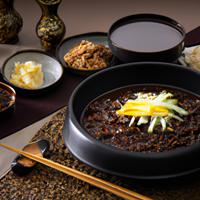
1 serving (500 grams) contains 700 calories, 15.0 grams of protein, 20.0 grams of fat, and 100.0 grams of carbohydrates.

Log this food in SnapCalorie

Nutrition Information
Calories |
336 | ||
|---|---|---|---|
% Daily Value* |
|||
| Total Fat | 9.6 g | 12% | |
| Saturated Fat | 2.4 g | 12% | |
| Polyunsaturated Fat | 0 g | ||
| Cholesterol | 14.4 mg | 4% | |
| Sodium | 720 mg | 31% | |
| Total Carbohydrates | 48 g | 17% | |
| Dietary Fiber | 2.4 g | 8% | |
| Sugars | 4.8 g | ||
| protein | 7.2 g | 14% | |
| Vitamin D | 0 mcg | 0% | |
| Calcium | 24 mg | 1% | |
| Iron | 1.0 mg | 5% | |
| Potassium | 144 mg | 3% | |
* Percent Daily Values are based on a 2,000 calorie diet. Your daily values may be higher or lower depending on your calorie needs.
Food Attributes
Source of Calories
About Jjajangmyeon
Jjajangmyeon is a beloved Korean-Chinese noodle dish featuring thick wheat noodles topped with a savory black bean sauce made from fermented black soybeans (chunjang). The sauce is stir-fried with ingredients like diced pork or beef, onion, zucchini, and cabbage, creating a rich and flavorful combination. Originating as a Chinese dish, it was adapted to Korean tastes and is now a staple comfort food in Korea. Nutritionally, Jjajangmyeon is a hearty, high-calorie dish due to its carbohydrate-rich noodles and flavorful, oil-based sauce. It provides protein from the meat and fiber from the vegetables. While it offers essential nutrients, it can be high in sodium and calories, especially when prepared with extra oil or fatty cuts of meat. For a healthier version, opt for less oil, lean protein, or additional vegetables to enhance its nutritional balance.



